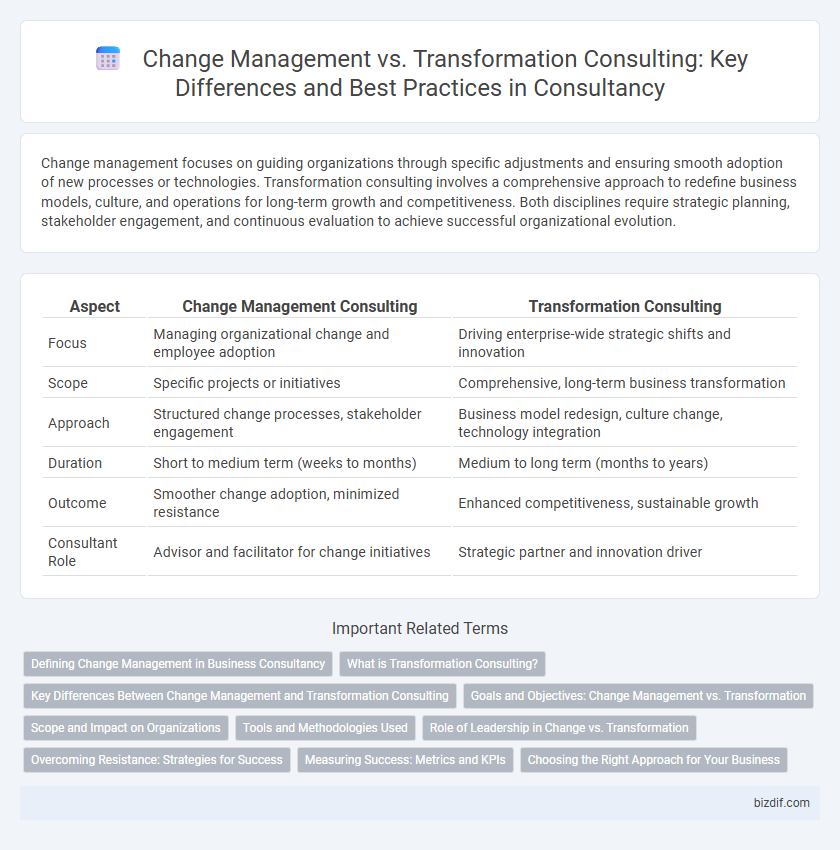Change management focuses on guiding organizations through specific adjustments and ensuring smooth adoption of new processes or technologies. Transformation consulting involves a comprehensive approach to redefine business models, culture, and operations for long-term growth and competitiveness. Both disciplines require strategic planning, stakeholder engagement, and continuous evaluation to achieve successful organizational evolution.
Table of Comparison
| Aspect | Change Management Consulting | Transformation Consulting |
|---|---|---|
| Focus | Managing organizational change and employee adoption | Driving enterprise-wide strategic shifts and innovation |
| Scope | Specific projects or initiatives | Comprehensive, long-term business transformation |
| Approach | Structured change processes, stakeholder engagement | Business model redesign, culture change, technology integration |
| Duration | Short to medium term (weeks to months) | Medium to long term (months to years) |
| Outcome | Smoother change adoption, minimized resistance | Enhanced competitiveness, sustainable growth |
| Consultant Role | Advisor and facilitator for change initiatives | Strategic partner and innovation driver |
Defining Change Management in Business Consultancy
Change management in business consultancy involves guiding organizations through structured processes to adapt to specific changes while minimizing disruption and resistance. This approach focuses on managing the people side of change by implementing communication strategies, training programs, and stakeholder engagement to ensure successful adoption. Unlike transformation consulting, which addresses broader, organization-wide shifts, change management targets individual projects or initiatives for seamless integration.
What is Transformation Consulting?
Transformation consulting involves guiding organizations through comprehensive, strategic shifts that realign business models, processes, and technologies to achieve long-term growth and competitive advantage. Unlike change management, which focuses on managing people and processes during specific changes, transformation consulting addresses end-to-end organizational evolution, including culture, leadership, and technology integration. This type of consulting helps companies navigate disruptions, innovate continuously, and embed agility into their core operations.
Key Differences Between Change Management and Transformation Consulting
Change management focuses on guiding employees through specific organizational changes using structured processes and communication strategies, aiming to minimize resistance and ensure smooth adoption. Transformation consulting takes a broader approach by redesigning business models, strategies, and operations to achieve long-term, large-scale organizational shifts. Key differences lie in scope, duration, and impact, with change management addressing incremental adjustments and transformation consulting driving fundamental, strategic evolution.
Goals and Objectives: Change Management vs. Transformation
Change Management focuses on guiding organizations through specific transitions, aiming to minimize disruption and ensure adoption of new processes or systems. Transformation Consulting targets broader, strategic shifts that redefine business models, culture, and long-term objectives to drive sustainable competitive advantage. Goals in Change Management prioritize operational stability and employee engagement, while Transformation emphasizes innovation, market repositioning, and fundamental organizational renewal.
Scope and Impact on Organizations
Change management focuses on guiding organizations through specific transitions to minimize disruption and ensure employee adoption, typically involving targeted adjustments within existing structures. Transformation consulting encompasses a broader, strategic scope aimed at fundamentally redesigning business models, processes, and culture to achieve long-term competitive advantage and systemic impact. Organizations undergoing transformation see comprehensive shifts across multiple departments and value chains, whereas change management addresses discrete projects with limited organizational scope.
Tools and Methodologies Used
Change Management relies on structured tools like ADKAR, Kotter's 8-Step Process, and Prosci's Change Triangle to facilitate incremental adjustments within organizational processes. Transformation Consulting employs comprehensive methodologies including Agile frameworks, Design Thinking, and Lean Six Sigma to drive large-scale, systemic shifts in business models and culture. Both approaches integrate data analytics and stakeholder engagement platforms to ensure alignment and measurable impact throughout the change lifecycle.
Role of Leadership in Change vs. Transformation
Leadership in change management primarily focuses on guiding teams through incremental adjustments by fostering clear communication and employee engagement. In transformation consulting, leadership drives a fundamental shift in organizational culture and vision, championing innovation and strategic realignment. Effective leaders in transformation act as catalysts for deep-rooted change, ensuring alignment across all levels to sustain long-term growth.
Overcoming Resistance: Strategies for Success
Overcoming resistance in change management requires targeted communication and stakeholder engagement strategies that address employee fears and uncertainties effectively. Transformation consulting emphasizes fostering a culture of adaptability and continuous improvement by aligning leadership vision with organizational goals. Successful implementation hinges on leveraging data-driven insights to tailor interventions and sustain long-term commitment throughout the transition process.
Measuring Success: Metrics and KPIs
Measuring success in Change Management typically centers on employee adoption rates, project milestones, and stakeholder engagement metrics, ensuring smooth implementation of specific initiatives. Transformation Consulting emphasizes broader KPIs such as business performance improvements, cultural shifts, and long-term value creation to evaluate systemic organizational changes. Accurate data analysis and continuous monitoring of these tailored metrics provide actionable insights for sustained growth and effective intervention.
Choosing the Right Approach for Your Business
Selecting between Change Management and Transformation Consulting hinges on the scope and impact of organizational shifts; Change Management focuses on managing employee adoption and minimizing resistance during process or technology updates, while Transformation Consulting addresses comprehensive, strategic overhaul including culture, business models, and operational frameworks. Effective decision-making involves assessing business goals, existing capabilities, and the urgency for innovation to align with either incremental adjustments or radical transformation initiatives. Leveraging expert consultancy ensures tailored strategies that drive sustainable growth and competitive advantage in dynamic markets.
Change Management vs Transformation Consulting Infographic

 bizdif.com
bizdif.com